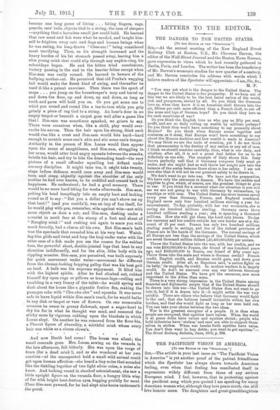LETTERS TO. THE EDITOR.
THE DANGER TO THE UNITED STATES.
[To TUX EDITOR 07 THZ "SPECTATOR:] Sift,--At the annual meeting of the New England Street Railway Club at Boston, 'U.S., Mr. Clarence Barron, the editor of the Wall Street Journal and the Boston News Bureau, gave expression to views which ho had recently gathered in Berlin, Paris, and London. The writer has been the beneficiary of Mr. Barron's economic studies for now quarter of a century, and Mr. Barron concludes his address with words which I believe readers of the Spectator will appreciate.—I am, Sir, &c.,
M. F.
"You may ask what is the danger to the United States. The danger to the United States is her prosperity. If we keep out of this war we are likely to be the best hated nation of the world, rich and prosperous, envied by all. Do you think the Germans love us, when they know it is an American shell thrown into the air, fifteen per cent. more efficient than a French shell, to cut off the arms and logs of German boys ? Do you think they love us for such munitions of war?
Do you think the English love us who pay us fifty per cent. profit, and see us daily rolling up wealth by millions perhaps ? Do you think they won't have something to say presently about Mexico? Do you think when Europe comes together and coalesces, as it must, that Europe won't have something to say about the Monroe doctrine and how wealth is made in America? Wo may think we are the lords of creation, yet I do not think that paramountcy is the destiny of any nation or any set of men. I think we should consider carefully, then, what is our duty, and whether, after all, it is not a great deal better for us to be definitely on one side. The example of Italy shows this. Italy knows perfectly well that if Germany conquers Italy must go under, and she might just as well throw her weight now into the balance of the scales because there alone is her safety. I am not sure also that it will not be our greatest safety to be drawn in.
We don't want to go into war. We have not the preparation. We have only the resources in finanoe. We have the credits and supplies to give, which, of course, are the greatest things to give in war. If you think for a moment what our situation is you will see we are not going to war with Germany by submarines, by warships or with men. The United States has more income saved every year than Germany, France, and England combined. England saves only four hundred millions sterling a year for reinvestment. To-day, probably, with her war economies, she is saving six hundred millions sterling. Germany saves three hundred millions sterling a year; she is spending a thousand millions. How she will get them the Lord only knows. To-day hor currency and her credits outside her own border are at a dis- count of 25 per cent. France has only two hundred millions sterling yearly in savings, and ten of the richest provinces of France are in the hands of the Germans. The normal savings of all Europe are less than the savings of the United States, which are seven thousand million dollars 01,400,000,000) per annum.
Throw the United States into the war, with her credits, and we can vote $500,000,000 to France, our friend of one hundred years ago, and $500,000,000 to Russia, our friend of fifty years ago. Throw these into the scale and where is German credit P French credit, English credit, and Russian credit gain, and down goes German credit. After all, as Napoleon said, 'a nation fights on its belly,' its supplies, its credit. In modern warfare it is largely credit. So don't be alarmed over any war between Germany and the United States. We have got the resources, now more important to the Allies than arms.
There is a very strong impression in the United States among financial and diplomatic people that if the United States should be drawn into this war—the United States does not want to go into it, but if it is drawn into it—it might settle the war very quickly. There are others who believe that Germany would fight to the end; that she believes herself invincible within her own borders, and that she would fight as long as her men held out You can take your choice between the two ideas.
War is the greatest energizer of a people. It is then when people are energized, that equities have values. When the world is at peace debts have values and equities shrink ; people who hold industries have ' strikes,' and men are able to support them- selves in strikes. When war breaks forth equities have value. You don't then want to buy debts; you want to get equities."— The Street Railway Bulletin, June, 1915, p. 208.


































 Previous page
Previous page